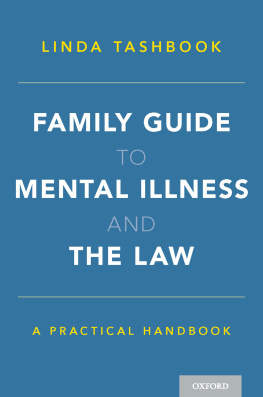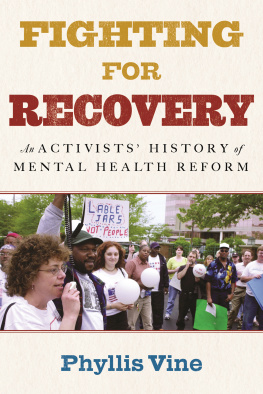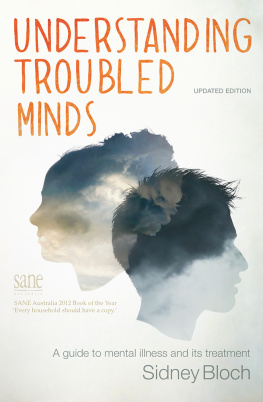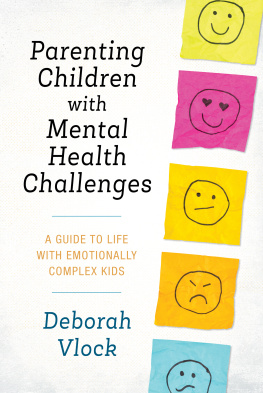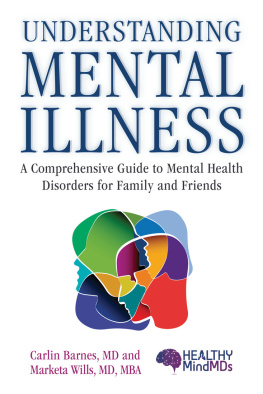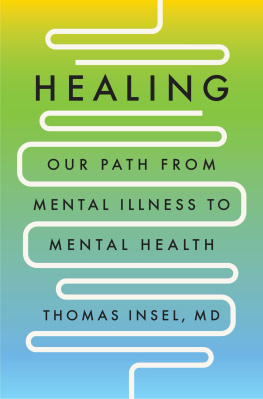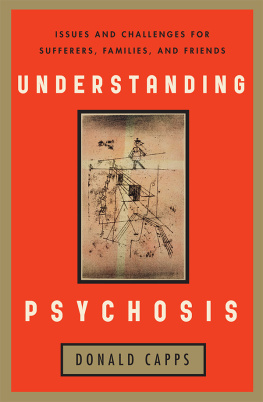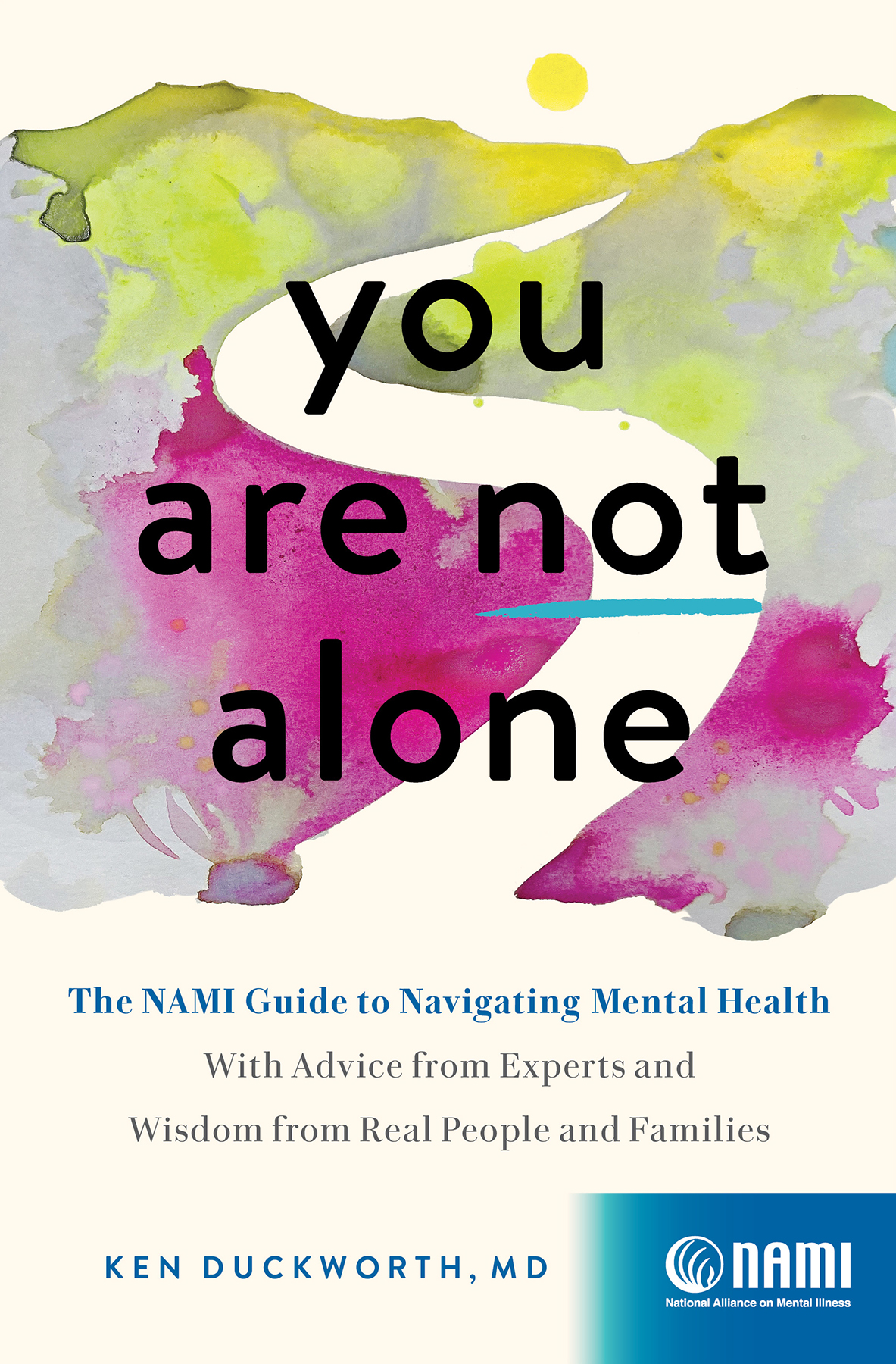Contents
Guide
Pagebreaks of the Print Version
The NAMI Guide to Navigating Mental Health
With Advice from Experts and Wisdomfrom Real People and Families
youare not alone
KEN DUCKWORTH, MD


Copyright 2022 by NAMI National
The contents of this book are not intended as a substitute for professional medical advice from your healthcare provider. All matters regarding your health require medical supervision. Neither the publisher nor the author shall be liable or responsible for any risk, loss, or damage allegedly arising from any information or suggestions in this book.
Zando supports the right to free expression and the value of copyright. The purpose of copyright is to encourage writers and artists to produce the creative works that enrich our culture. Thank you for buying an authorized edition of this book and for complying with copyright laws by not reproducing, scanning, uploading, or distributing this book or any part of it without permission. If you would like permission to use material from the book (other than for brief quotations embodied in reviews), please contact .
Zando
zandoprojects.com
First Edition: September 2022
Text design by Aubrey Khan, Neuwirth & Associates, Inc.
Cover design by Evan Gaffney
Cover art by June Glasson
The publisher does not have control over and is not responsible for author or other third-party websites (or their content).
Library of Congress Control Number: 2022935062
978-1-63893-000-6 (Hardcover)
978-1-63893-001-3 (ebook)
10 9 8 7 6 5 4 3 2 1
Manufactured in the United States of America
CONTENTS
FOREWORD
As the CEO of the National Alliance on Mental Illness (NAMI), I often describe our organization as a community that cares. Not only is this our motto, but it is also a goal we aspire to every day. At NAMI, we want to ensure we reach as many people as possible, using as many mediums as possible. With that in mind, we are publishing You Are Not Alone: The NAMI Guide to Navigating Mental Healthour first-ever bookwhich will stand as a long-lasting, physical embodiment of our mission.
While this is a NAMI project, the content is not about our organization. The book offers advice on navigating a challenging and complicated mental health care system, as well as ways of finding a path to recovery, so that everyday people can live well with mental illness. The intention of this book is core to NAMIs mission of building better lives for the millions of Americans affected by mental illnessand it is why all proceeds will go back to NAMI in order to support our work.
When Dr. Ken Duckworth came to me with the idea of writing a book that could help people on their road to recovery, I knew it was something we had to do. Those of us who have been impacted by mental illness know what it is like to seek guidance only to receive silence and shame in response. I believe that getting the support and guidance you need should be as easy as entering your local bookstore, asking, What should I read if my kid is struggling with their mental health, and I dont know where to start? and being answered with, This comprehensive guide called You Are Not Alone.
This book will help you gain perspective and advice from what we call lived experience experts. These are people using their real names, sharing their stories, and talking about what theyve learned. This is how we break down social barrierswith real people being open and vulnerable. We are also pairing their knowledge with traditional research experts to give the reader the best of all these perspectives.
Our mission is well represented by the stories we share, which focuses on first-person experience from people with mental illness, as well as those of their family members and loved ones. As Dr. Duckworth writes, At NAMI, family members and peers are joined in the same mission, but not with the same perspective. The belief that listening to alternative viewpoints deepens understanding is at the core of why NAMI has chosen to be inclusive.
Whether you are experiencing mental illness symptoms for the first time, are a caregiver of someone who is struggling, or just a concerned friend or family member, I hope that this resource will help you to determine next steps for yourself or your loved one. There is a whole community of people who care about what youre going throughthe NAMI familyand we are here to provide guidance, community, and support on your mental health journey. Indeed, you are not alone.
Sincerely,
DANIEL H. GILLISON JR.,
CEO, National Alliance on Mental Illness
INTRODUCTION
I know what its like to feel alone.
Thats why I decided to write a guide on living, and recovering, with mental illness. No such guide existed when I personally needed it, and many other people I have lovedincluding my fatheror who I have come to know as a doctor, colleague, or friend, have been without a guide to turn to as well.
My dad was a fun, charismatic, loving, and generous man who was episodically ill with bipolar disorder. Back when he needed help, our family had no tools to navigate the convoluted mental health system. When he was hospitalized, we didnt even consider discussing next steps with the professionals who were caring for him, because we didnt know that was something to discuss. We did not have the language to talk with his doctors or with each other. My fathers doctors did not offer any counsel about what my dad could do to reduce his symptoms or extend the time between his episodes, and we knew nothing of the science that might help us. There was no book to read that laid out options for treatment. We were ashamed, isolated, and uninformed. When other people were sick, friends, colleagues, and family members sent cards and brought casseroles, but when my father was ill, our family tried to pretend nothing was wrong, and even the people who knew something was wrong did not send or bring anything. No casseroles, no flowers, no cards.
I decided to become a psychiatrist to find answers to my questions about my dad and his illnessto help him, my family, and other families. When I announced that I was applying to medical school, my family was initially thrilled. My older siblings, Sue and Joe, had been the first in our family to attend college; our relatives in prior generations were security guards, seamstresses, salespeople, and ministers. So, my decision to set aside my initial interest in political science and history to study medicine was greeted with praise. A doctor! A (shame-reducing) home run!
However, my choice to go into psychiatry, rather than becoming a successful surgeon or cardiologist, was much less well received. For decades, Dad held out hope that I would choose another specialty, calling me during my psychiatric residency to ask, How was the operating room? He loved me deeply, but he didnt want this path for me; it was just too close to his deepest source of shame.
I was also surprised that, at that time, psychiatry was not ready to consider my motivation for entering the profession as legitimate. On my psychiatry residency applications, my essay about my dads illness and my quest to help him seemed to violate an unwritten rule. It was ignored at programs across the nation, while interviewers engaged with me on topics relating to the practice of medicine, my volunteer work, or even college football. One person at a prestigious hospital told me my reason for entering the field was a terrible one but might have been acceptable if my father had been a psychiatrist himself and not just a patient. I was devastated. Only one person who interviewed me, Ned Hallowell, told me that my personal experience could be helpful in my professional life, and so I joined his program at the Massachusetts Mental Health Center in Boston, where I am still on the faculty. Fortunately, sharing ones personal experience of being affected by mental health conditions is becoming more acceptable in applications to the mental health field.


